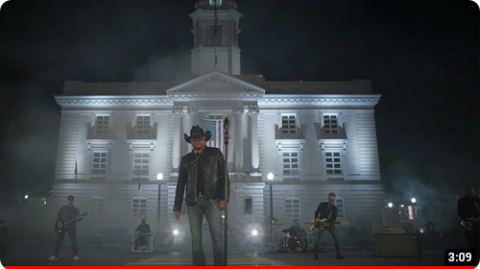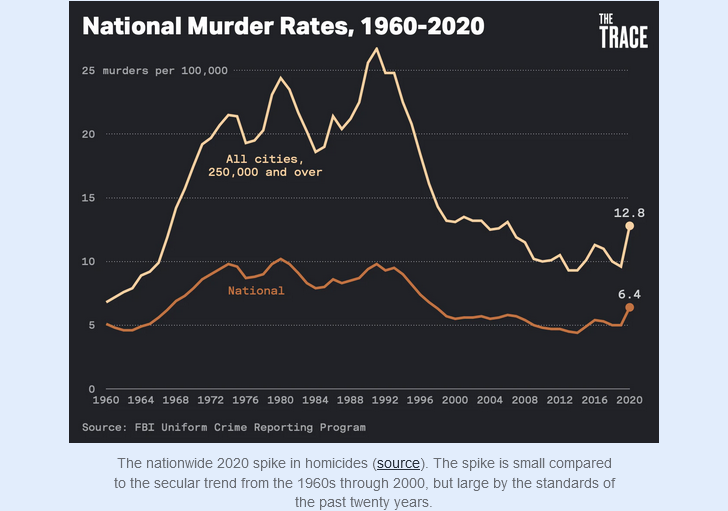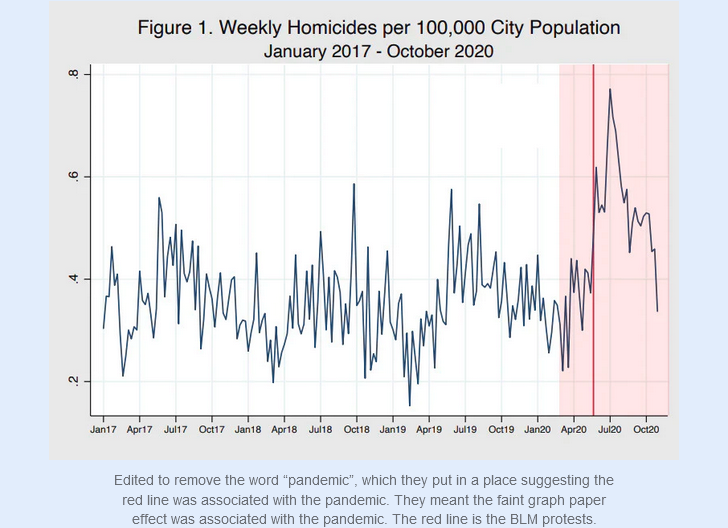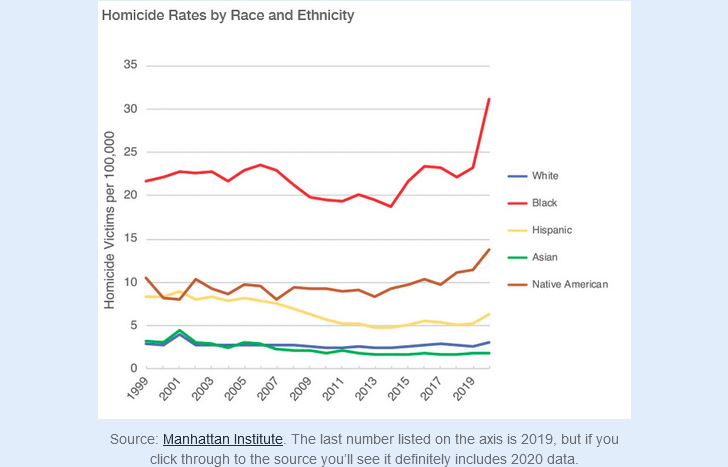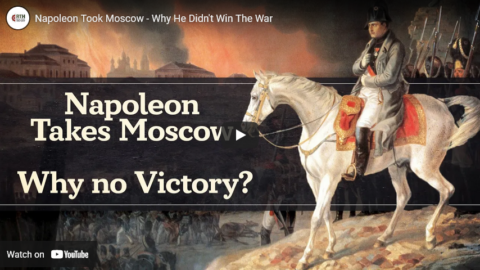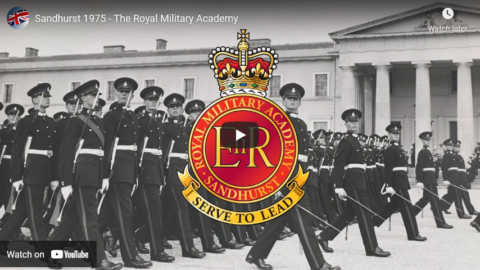The Korean War by Indy Neidell
Published 7 Mar 2025The battles on the Korean peninsula started long before 1950. Today Sparty looks back at the uprising and insurgency on Jeju Island in 1948, the threat of Communist revolt, and the harsh reaction of the Korean government. This really was the war before the war.
(more…)
March 8, 2025
Murder in the Name of Democracy – War Against Humanity 002
December 20, 2024
Election Fever – Rise of Hitler 08, August 1930
World War Two
Published 19 December 2024August 1930 brings Germany to a critical juncture as parties prepare for the September elections. Amid street violence, bans on political uniforms, and soaring unemployment, the stakes couldn’t be higher. This episode unpacks the campaign strategies, shifting alliances, and rising tensions shaping the Republic’s future.
(more…)
August 10, 2024
February 1, 2024
Newfoundland – “We used to be a country”
In The Line, James McLeod outlines a difficult period for the Dominion of Newfoundland which ended up narrowly voting to join Canada rather than resume self-rule that they’d had up to 1934 when the Newfoundland House of Assembly abolished itself:
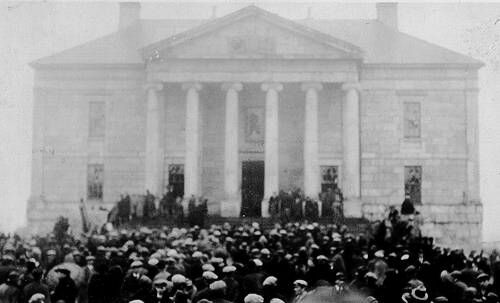
Great Riot of 1932 in front of the legislature, the Colonial Building, in Newfoundland.
Provincial Archives of Newfoundland and Labrador (Reference PANL A2-160), via Wikimedia Commons.
Before 1933, Newfoundland was proudly a dominion within the British empire. Under the Statute of Westminster, Newfoundland had the same legal status as Canada, New Zealand, South Africa and the Irish Free State.
Newfoundland was its own country. But it was a country in rough shape.
A year before the Amulree Report was published, a mob of about 10,000 people had gathered outside the Colonial Building in St. John’s. Families were living in destitution on six-cents-a-day government dole, and the government’s finance minister had just resigned and accused Prime Minister Richard Squires of personally lining his pockets with government funds.
The mob turned into a riot, which ultimately barged into the government building. Notably, the rioters briefly paused to observe a respectful silence when a brass band began playing “God Save The King”, but then they went back to rioting.
Squires fled on foot and went into hiding, and then emerged to call an election, which he lost in a landslide. During the campaign, one of his longtime allies, the prominent leader of the Fishermen’s Protective Union, openly wished for fascism.
“What is required for Newfoundland and what is most essential for the present conditions is a Mussolini,” said William Coaker.
Months later, with a new government, Newfoundland was on the verge of defaulting on its debt, and the British stepped in.
The vastly oversimplified version is that the British government was concerned that a member of the British Commonwealth defaulting on its debt could have major implications for the whole empire. So the British government bailed out Newfoundland, on the condition that a commission would be struck to investigate the island’s political and economic affairs. Lord Amulree, a British politician, was appointed as chair.
A year later, with the Dominion still teetering on the verge of bankruptcy, the Amulree Report was delivered. It contained this passage, with my emphasis added: “That it was essential that the country should be given a rest from politics for a period of years was indeed recognised by the great majority of the witnesses who appeared before us, many of whom had themselves played a prominent part in the political and public life of the Island.”
Amulree considered the possibility of some sort of national unity government, but could not get past the conclusion that, “Even if a National Government could be established on a basis which led to a suspension of political rivalry, the underlying influences which do so much to clog the wheels of administration and to divert attention from the true interests of the country would continue to form an insuperable handicap to the rehabilitation of the Island.”
In 1934, the Newfoundland House of Assembly voted itself out of existence. It was replaced by a “Commission of Government” which was just six unelected men, appointed by the British. Fifteen years later, Newfoundlanders narrowly voted to join Canada, although to this day conspiracy theories still linger about how democratic the referendum really was.
I am not a Newfoundlander, and I’m hesitant to make any sweeping statements about how Newfoundlanders relate to their own history. But for a decade, I worked as a journalist in St. John’s, covering politics and public affairs. The collapse of democratic self-rule in the 1930s still looms large in the collective identity of the province.
July 21, 2023
Country music world (and legacy media) convulsed by country song that isn’t woke
There’s been a lot of wailing by the usual suspects about a recent video released by Jason Aldean for his song “Try That in a Small Town”, alleging all sorts of horrible things including promotion of lynching, outright racism, and inciting violence:
… writer Zachary Faria notes that the left is rabidly protective of Black Lives Matter. In fact, they’re so protective of it that they’ll take issue with criticism of literally anything that ever even happened at a Black Lives Matter protest.
Entire neighborhoods were burned to the ground? A small price to pay for social justice, at least in their minds.
So the idea of people standing up to them — warning them to try that in a small town — is despicable.
Remember that these are the same people who continue to accuse Kyle Rittenhouse of murder despite having been acquitted of the crime. These are the same people who call the kid a racist despite him having shot three white dudes. They say he acted unprovoked despite one trying to take his gun from him, another hitting him in the head with a blunt object, and a third literally pointing a gun at him.
Through it all, they act like Rittenhouse should have just rolled over and allowed his murder to happen, all because the cause of Black Lives Matter cannot be criticized.
Where Aldean sinned is because he, too, thinks ill of the riots that engulfed every major city in this nation.
He’s harkening back to a time when communities were full of people protecting one another. That’s a very good thing, and I’m someone who would love to see that happen again.
Instead, the people claiming that Aldean’s song is about lynching are telling on themselves.
There doesn’t seem to be any part of the song that says a thing about black people or anything like that. In fact, most of the people involved in the riots, at least as I saw them, seemed to be white. But the fact that this is where the leftists went tells us plenty. It tells us they think the only kind of person who would cross that line is a black person.
July 18, 2023
QotD: “Nothing to lose”
The article was written in a for-and-against fashion, giving both sides a fair opportunity to put their case. And the case for the practice was that it allowed people to express their anger, whose object was not specified. In other words it was their anger which made them and their actions morally right; presumably, therefore, the angrier they, or anyone else, felt, the more rightful they became. This does not seem to me to be a recipe for psychic, let alone, social, harmony, but rather for a permanent Balkan war of the soul.
In line with the notion that people need “a stake in society” in order to refrain from breaking shop windows and taking what they think they have been wrongfully denied (interestingly, the bookshop was the only shop in a very badly looted commercial street that went completely unscathed during the riots), a man called Earl Jenkins — “who was one of up to 60 youth workers who went on to the streets of Toxteth [a poor area of Liverpool] during the disturbances to persuade youngsters not to get involved” — was reported in the Guardian to have said, “If you’ve got nothing to lose, you’ll do what you can to survive, won’t you?”
There was no comment in the newspaper on the deep contradiction in the attitude of Earl Jenkins (let us leave aside the question of how many “youth workers” in Toxteth are needed to prevent a riot there). For if it is true that the riots were a survival mechanism, why was Earl Jenkins trying to persuade young people not to join in? Did he not want them to survive? Suffice it to say that the objects looted during the riots were not such as people on the verge of famine, or who fear that famine is around the corner, might be expected to loot. They were, rather, the things that spoilt children might be expected to want for their birthday.
The term “If you’ve got nothing to lose” in this context is ambiguous. It might mean such penury, such drastic poverty, that you possessed nothing that could have been removed from you. But it clearly cannot mean this, since all the rioters were at liberty, and were clothed, fed, housed, educated (if unsuccessfully), provided with medical care, and given at least a small income, much of which could, in theory at any rate, be removed from them. They could be made homeless; their central heating could be turned off; they could go hungry and literally penniless, made to wear rags; their telephones could be taken from them; they could be deprived of their liberty and even enslaved.
But none of this was going to happen to them and they knew it perfectly well; so in this sense it was indeed true that they had nothing to lose. One of the commissioners appointed to enquire into the riots actually put it succinctly:
When people don’t feel they have a reason to stay out of trouble, the consequences for communities can be devastating …
But the reason they “don’t feel a reason to stay out of trouble” is not because they have nothing to lose in the sense of being so deeply impoverished that they have nothing removable from them, it is because they have nothing to lose because they know that whatever they have will never be removed from them, under any circumstances whatever.
Theodore Dalrymple, “It’s a riot”, New English Review, 2012-04.
July 15, 2023
The French Intifada
Ed West on the origins of the rising violence in French towns and cities:
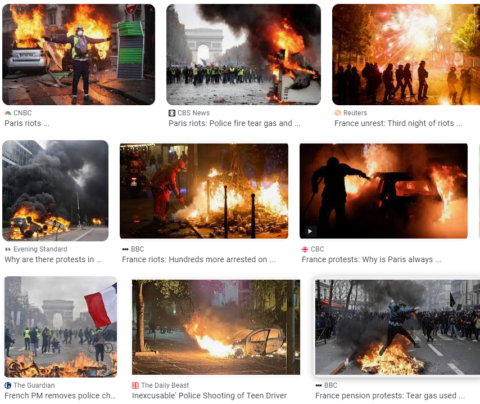
I ran an image search for “Paris rioting” and there was a plentiful supply of fiery, eye-catching photos. Not all of these are from the most recent outbreak of violence, but they are certainly representative of how the legacy media is covering the situation.
The recent violence in Paris and elsewhere, which saw attempts to ram the home of a mayor, once again highlighted the trouble the country has with integration. But the French police union describing themselves as being “at war with vermin” illustrated the different mindset to the English-speaking world, and the far more belligerent approach to the problems of diversity.
Like Britain, the Netherlands, Germany and Sweden, France has had difficulties assimilating the children of immigrants from beyond Europe, yet its recent history has proved especially violent and troubled. Britain has jihadi terrorism – 2017 was especially grim – but it has never reached such intensity. Today, as over 130,000 police officers stand guard to protect the Republic on the day of its celebration, it is worth considering the journey that brought it to such a state.
Analysts have often compared Britain’s state multiculturalism with France’s system of laïcité, which tends to downplay the existence of “communities” even to the point of not taking demographic statistics. Although neither country’s approach has entirely been a success, France’s refusal to recognise immigrants as anything but French has often been blamed for the widespread sense of alienation.
Others point to the housing system, which tends towards concentrations of North and West Africans in suburban banlieues, or the less laissez-faire economic policy which results in higher unemployment (in exchange for better social security).
While they no doubt play a part, the biggest single difference is history, as Andrew Hussey recounted back in 2014 in The French Intifada, in particular France’s history with North Africa. To put it in British terms, imagine that Britain’s rule in Pakistan had involved not a small number of administrators and soldiers but instead hundreds of thousands of British settlers arriving in the country, many with the intention of making it a “new America” (i.e. driving the natives out).
That Britain had declared Pakistan an integral part of the country, and that, rather than scarpering in indecent haste when the empire began to disintegrate, Britain had dug in to preserve its rule in a sadistic war of independence, one in which natives and white settlers committed countless atrocities against each other.
And that this violence had spilled into Britain with assassination attempts and terrorism, by both sides, destabilising the country to the point where there was talk of a coup. And that this was happening just as large-scale immigration to the colonial power was taking place.
Britain experienced nothing like as much violence in the dying days of empire, and indeed the only real comparison with our history was the moment when there was almost all-out conflict between Britain’s Protestant and Irish Catholic populations before the First World War.
If French politicians so casually talk of “civil war” between its right wing and the Algerian-descended population, it is because it has already played out this conflict before – one that was never healed, and so invites a sequel.
April 16, 2023
Raising the minimum retirement age may be necessary, but it will never be politically popular
As protests and riots continue against the French government’s attempt to raise the minimum retirement age from 62 to 64, Theodore Dalrymple explains why he finds sympathy with the working poor who will be most directly hurt by the change:
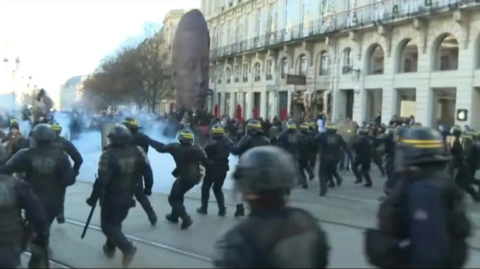
Riot police on the streets of Bordeaux as violent protests against French government plans to raise the retirement age continue.
YouTube screen capture from an AFP report.
As I hope to be able to work till my dying day, I am perhaps not the right person to animadvert on the present disturbances in France about the raising of the retirement age from 62 to 64. My work has always been pleasing to me, and it remains so; I even manage to delude myself sometimes that it is important.
I am forced to recognize, however, that not everyone is in the same happy position as I. I am sure that if I had been a dustman all my life, I should not hope to be emptying dustbins at my present age (73), let alone at the age of 85. While my work remains work, and in a certain sense occasionally even hard work, especially when I have to think, what I do is not physically demanding. No one ever got arthritis or fibrosis of the lung by writing a few articles.
The reform of the pension system in France, from my limited understanding of it, is rather unfair. It is true that some reform is necessary: There are ever fewer workers to fund the pensions of ever more pensioners (the system being entirely unfunded by investment). On the other hand, it is those who do the most unpleasant and unremunerative jobs who have to work the longest, and the reform only increases this unfairness. As the old cockney song has it, it’s the rich what gets the pleasure.
Nevertheless, the extreme opposition to the reform, which is hardly a radical one, strikes most foreigners as rather strange. In a way it is also sad, for it implies that a long retirement is the main aim of all that precedes it, which in turn implies that all the work done for several decades before retirement has been an unpleasant imposition rather than something of value in itself. That the quid pro quo for a longer life expectancy is a greater number of years spent working seems not to strike anyone with force.
The demonstrators probably think, no doubt correctly, that the reform is the thin end of a wedge: If it is allowed to pass without a fuss, there will be further such reforms until the retirement age will be 70, 80, or never, depending on life expectancy. As for the younger demonstrators, they do not seem to worry much that it is they who will be paying for the people older than themselves to retire early, the distant prospect of early retirement being more real to them than the far more proximate high rates of taxation.
September 16, 2022
The Byzantine Empire: Part 3 – The Age of Justinian – Cashing in the Gains of the Fifth Century
seangabb
Published 7 Dec 2022Between 330 AD and 1453, Constantinople (modern Istanbul) was the capital of the Roman Empire, otherwise known as the Later Roman Empire, the Eastern Roman Empire, the Mediaeval Roman Empire, or the Byzantine Empire. For most of this time, it was the largest and richest city in Christendom. The territories of which it was the central capital enjoyed better protections of life, liberty and property, and a higher standard of living, than any other Christian territory, and usually compared favourably with the neighbouring and rival Islamic empires.
The purpose of this course is to give an overview of Byzantine history, from the refoundation of the City by Constantine the Great to its final capture by the Turks.
Here is a series of lectures given by Sean Gabb in late 2021, in which he discusses and tries to explain the history of Byzantium. For reasons of politeness and data protection, all student contributions have been removed.
(more…)
June 30, 2022
2020’s spike in homicides in the United States
At Astral Codex Ten, Scott Alexander looks at the rapid rise in murders across the United States in early 2020, and considers the common explanation for the phenomenon:
In my review of San Fransicko, I mentioned that it was hard to separate the effect of San Francisco’s local policies from the general 2020 spike in homicides, which I attributed to the Black Lives Matter protests and subsequent police pullback.
Several people in the comments questioned my attribution, saying that they’d read news articles saying the homicide spike was because of the pandemic, or that nobody knew what was causing the spike. I agree there are many articles like that, but I disagree with them. Here’s why:
Timing
When exactly did the spike start? The nation shut down for the pandemic in mid-March 2020, but the BLM protests didn’t start until after George Floyd’s death in late May 2020. So did the homicide spike start in March, or May?
Let’s check in with the Council on Criminal Justice:
It very clearly started in late May, not mid-March. The months of March, April, and early May had the same number of homicides as usual.
[…]
Police Pullback
My specific claim is that the protests caused police to do less policing in predominantly black areas. This could be because of any of:
- Police interpreted the protests as a demand for less policing, and complied.
- Police felt angry and disrespected after the protests, and decided to police less in order to show everybody how much they needed them.
- Police worried they would be punished so severely for any fatal mistake that they made during policing that they were less willing to take the risk.
- The “Defund The Police” movement actually resulted in police being defunded, either of literal funds or political capital, and that made it harder for them to police.
I don’t want to speculate on which of these factors was most decisive, only to say that at least one of them must be true, and that police did in fact pull back.
[…]
Victims
Who is being targeted in these extra murders?
The 2020 homicide spike primarily targeted blacks.
(there also seems to be a much smaller spike for Native Americans, but there are so few Natives that I think this might be random, or unrelated).
Most violent crime is within a racial community, and there was no corresponding rise in hate crimes the way I would expect if this was whites targeting blacks, so I think the perpetrators were most likely also black. This was a rise in the level of violence within black communities.
A priori there’s no reason to expect lockdowns and “cabin fever” to hit blacks much harder than every other ethnic group. But there are lots of reasons to expect that the Black Lives Matter protests would cause police to pull back from black communities in particular. I think this is independent evidence that the homicide spike was because of the protests and not the pandemic.
May 13, 2022
Napoleon Took Moscow – Why He Didn’t Win The War
Real Time History
Published 12 May 2022Support us on Patreon: https://patreon.com/realtimehistory
After the Battle of Borodino, both sides are badly mauled. Napoleon’s army marches on and reaches Moscow, the old Russian capital. In the Emperor’s eyes, capturing the city should win him the war. But while the local Russians set fire to the city, the Tsar in St. Petersburg and the Russian army command are thinking about turning the tide of the war — and not about accepting a French victory.
» THANK YOU TO OUR CO-PRODUCERS
John Ozment, James Darcangelo, Jacob Carter Landt, Thomas Brendan, Kurt Gillies, Scott Deederly, John Belland, Adam Smith, Taylor Allen, Rustem Sharipov, Christoph Wolf, Simen Røste, Marcus Bondura, Ramon Rijkhoek, Theodore Patrick Shannon, Philip Schoffman, Avi Woolf,» SOURCES
Boudon, Jacques-Olivier. Napoléon et la campagne de Russie en 1812. 2021.
Lieven, Dominic. Russia Against Napoleon. 2010.
Rey, Marie-Pierre. L’effroyable tragédie: une nouvelle histoire de la campagne de Russie. 2012.
Zamoyski, Adam. 1812: Napoleon’s Fatal March on Moscow. 2005.» OUR STORE
Website: https://realtimehistory.net»CREDITS
Presented by: Jesse Alexander
Written by: Jesse Alexander
Director: Toni Steller & Florian Wittig
Director of Photography: Toni Steller
Sound: Above Zero
Editing: Toni Steller
Motion Design: Toni Steller
Mixing, Mastering & Sound Design: http://above-zero.com
Digital Maps: Canadian Research and Mapping Association (CRMA)
Research by: Jesse Alexander
Fact checking: Florian WittigChannel Design: Simon Buckmaster
Contains licensed material by getty images
Maps: MapTiler/OpenStreetMap Contributors & GEOlayers3
All rights reserved – Real Time History GmbH 2022
April 29, 2022
QotD: The Rooftop Koreans
We should all be ready to do our duty as American citizens and, when duty calls, each of us should embrace our inner Rooftop Korean.
The year was 1992, 27 years ago right about now, and the city was Los Angeles. Several police officers who got into a videotaped brawl with a petty criminal named Rodney King were acquitted of beating him up. The city exploded. It was chaos.
I was a first-year law student, back a year from the Gulf War, and I had just joined the California Army National Guard. My unit was the 3rd Battalion, 160th Infantry, and we got called up early the first night and were on the streets for three long weeks. Making it even more delightful was the fact that the unit was in Inglewood, which was pretty much on fire. They burned most everything around, except our armory – that would have gone badly for them – and the Astro Burger.
My battalion commander grabbed then-First Lieutenant Schlichter, and we went all over the city in his humvee as he led his deployed and dispersed troops. Our soldiers came, in large part, from the areas most effected by the riots, and they were notably unpleasant to the thugs and criminals who quickly discovered our guys had no patience for nonsense. One dummy discovered that the hard way when he tried to run over some Guard soldiers from another battalion; he had a closed casket funeral.
The city went insane. Order simply ceased to exist. It was Lord of the Flies. I remember a cop totally breaking down because everything was completely out of control.
But I had a M16A1 – a real assault rifle – and I had a bunch of buddies with M16A1s. The regular folks … not so much. The decent people of LA were terrified, and with good reason. See, the dirty little secret of civilization is that it’s designed to maintain order when 99.9% of folks are orderly. But, say, if just 2% of folks stop playing by the rules … uh oh. Say LA’s population was 15 million in 1992 … that’s 300,000 bad guys. There were maybe 20,000 cops in all the area agencies then, plus 20,000 National Guard soldiers and airman, plus another 10,000 active soldiers and Marines the feds brought in. Law enforcement is based on the concept that most people will behave and that the crooks will be overwhelmed by sheer numbers of officers. But in the LA riots, law enforcement was massively outnumbered. Imposing order took time.
And until then, our citizens were on their own, at the mercy of the mob. Betting that the cavalry was going to come save you was a losing bet.
LA’s Korean shopkeepers knew that. They operated many small businesses in some of the least fashionable areas of Los Angeles, and they were already widely hated by activists, being scapegoated for problems and pathologies that long pre-dated their immigration to Southern California. So, they became targets for the mobs.
Bad decision by the mobs.
See, most of these Koreans had done their mandatory service in the Republic of Korea’s Army. Those ROK soldiers are the real deal – the Norks are not a theoretical threat and the South Korean army does not spend a lot of time talking about feelings. They were some solid dudes. So, when the local dirtbags showed up for some casual looting, they noticed the rooftops were lined with hardcore guys packing some serious heat, including the kind of scary rifles that the Democrats want to ban.
The Rooftop Koreans.
It did not take long for the bad guys to realize that the Rooftop Koreans were not playing games – they were playing for keeps. The mob went away in search of softer targets.
There’s a lesson there.
Kurt Schlichter, “Be A Rooftop Korean”, Townhall.com, 2019-05-02.
February 28, 2022
Roman Republic to Empire 03 Inequality and Corruption
seangabb
Published 5 Feb 2021[Update 2023-03-02 – Dr. Gabb took down the original posts and re-uploaded them.]
Here is the third lecture, which describes the decay of the Roman Constitution as a result of changes in patterns of land tenure in Italy after the Second Punic War, and as a result of the flood of foreign money into Rome from military victories and war indemnities and bribes.
(more…)
December 3, 2021
Australian-American War of 1942 – The Battle of Brisbane
World War Two
Published 2 Dec 2021America shares a language and large parts of its culture with Britain and Australia. But when tens of thousands of US troops arrive in 1942, things will be far from smooth. While the alliance remains firm, their soldiers will spend almost as much time fighting each other as they do the Axis.
(more…)
November 2, 2021
Sandhurst 1975 – The Royal Military Academy
British Army Documentaries
Published 21 Feb 2021Filmed in 1975, this documentary is set at Sandhurst, the officer training academy. It follows a group of young men preparing for a life of leadership in the Army. These “managers of violence” will be expected to perform to the very highest of traditions of the British Army and be prepared to apply their professionalism on British soil should the need arise.
© 1975
This production is for viewing purposes only and should not be reproduced without prior consent.
This film is part of a comprehensive collection of contemporary Military Training programmes and supporting documentation including scripts, storyboards and cue sheets.
All material is stored and archived. World War II and post-war material along with all original film material are held by the Imperial War Museum Film and Video Archive.


